|
Books Should Be Free Loyal Books Free Public Domain Audiobooks & eBook Downloads |
|
|
Books Should Be Free Loyal Books Free Public Domain Audiobooks & eBook Downloads |
|
Top Authors |
|---|
|
Book type:
Sort by:
|
By: Robert Michael Ballantyne (1825-1894) | |
|---|---|
 The Thorogood Family
The Thorogood Family
| |
 The Settler and the Savage
The Settler and the Savage
| |
 The Lighthouse
The Lighthouse
| |
 Handbook to the new Gold-fields
Handbook to the new Gold-fields
| |
 Red Rooney The Last of the Crew
Red Rooney The Last of the Crew
| |
 Up in the Clouds Balloon Voyages
Up in the Clouds Balloon Voyages
| |
 The Young Fur Traders
The Young Fur Traders
| |
 Jarwin and Cuffy
Jarwin and Cuffy
Jarwin is an English sailor who has been shipwrecked. He is stranded on a raft with only his dog Cuffy, and land is nowhere in sight. Their food and water is running out. What can Jarwin do to save his dog's (and his own) life? | |
 Philosopher Jack
Philosopher Jack
| |
 The Hot Swamp
The Hot Swamp
| |
 The Crew of the Water Wagtail
The Crew of the Water Wagtail
| |
 The Young Trawler
The Young Trawler
| |
 Erling the Bold
Erling the Bold
| |
 Chasing the Sun
Chasing the Sun
| |
 Blown to Bits The Lonely Man of Rakata, the Malay Archipelago
Blown to Bits The Lonely Man of Rakata, the Malay Archipelago
| |
 The Red Man's Revenge A Tale of The Red River Flood
The Red Man's Revenge A Tale of The Red River Flood
| |
 The World of Ice
The World of Ice
| |
 Fighting the Flames
Fighting the Flames
| |
 Shifting Winds A Tough Yarn
Shifting Winds A Tough Yarn
| |
 Hunted and Harried
Hunted and Harried
| |
 The Battle and the Breeze
The Battle and the Breeze
| |
 Fort Desolation Red Indians and Fur Traders of Rupert's Land
Fort Desolation Red Indians and Fur Traders of Rupert's Land
| |
 Martin Rattler
Martin Rattler
| |
 Sunk at Sea
Sunk at Sea
| |
 Wrecked but not Ruined
Wrecked but not Ruined
| |
 Fighting the Whales
Fighting the Whales
| |
 Saved by the Lifeboat
Saved by the Lifeboat
| |
 Martin Rattler
Martin Rattler
| |
 Twice Bought
Twice Bought
This story is set in the gold fields of Oregon, where Tom Brixton, and his best friend, Fred Westly, are digging gold to try to “make their pile”. Before leaving England, the steady and God-fearing Fred had promised Tom's mother that he would do his best to take care of his friend, but in spite of all his efforts, Tom had fallen in with bad companions and taken to gambling. He was convinced that he could make his fortune quicker by attempting to increase it at the dice or card table, and all his friend's attempts to make him see his errors were unavailing... | |
 The Story of the Rock
The Story of the Rock
| |
 Jeff Benson, or the Young Coastguardsman
Jeff Benson, or the Young Coastguardsman
| |
 The Lively Poll A Tale of the North Sea
The Lively Poll A Tale of the North Sea
| |
 The Lighthouse
The Lighthouse
| |
 The Wild Man of the West A Tale of the Rocky Mountains
The Wild Man of the West A Tale of the Rocky Mountains
| |
By: John S. C. Abbott (1805-1877) | |
|---|---|
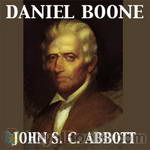 Daniel Boone
Daniel Boone
This is a detailed biography of the life and adventures of Daniel Boone. His accomplishments are brushed over in history classes these days and not given the recognition they deserve. This biography clearly paints a picture of the benevolent person of Daniel Boone as well as the achievements he made in furthering European settlement in America. | |
By: Johnston McCulley (1883-1958) | |
|---|---|
 The Black Star
The Black Star
The Black Star was a master criminal who took great care to never be identifiable, always wore a mask so nobody knew what he looked like, rarely spoke to keep his voice from being recognized, and the only mark left at the scenes of the crimes which he and his gang committed were small black stars which were tacked as a sign of their presence, and an occasional sarcastic note to signify his presence and responsibility. Even those who worked for him knew nothing of him, all of which were making his crimes virtually unsolvable... | |
By: Mrs. Isabella Beeton (1836-1865) | |
|---|---|
 The Book of Household Management
The Book of Household Management
“Mrs. Beeton’s” is a guide to all aspects of running a household in Victorian Britain. Published in 1861, it was an immediate bestseller, running to millions of copies within just a few years. In the cookery sections, Mrs. Beeton follows the animal “from his birth to his appearance on the table.” Learn how to care for poultry during moulting season, how to wean calves, how to cure hams, salt cod, carve mutton, and much more. | |
By: United States Office of Strategic Services | |
|---|---|
 Simple Sabotage Field Manual
Simple Sabotage Field Manual
Formed during World War II, the United States Office of Strategic Services (OSS), was organized for special operations and intelligence gathering and analysis. Included in its mission was the implementation of, and training of foreign forces in, propaganda, espionage, subversion, and sabotage. After the war, OSS functions were transferred to the newly formed Central Intelligence Agency (CIA). This “Simple Sabotage Field Manual” was used by OSS agents in training “citizen-saboteurs” in methods for inciting and executing simple sabotage to thwart industry and other vital functions in Axis-occupied areas. | |
By: Goldsworthy Lowes Dickinson (1862-1932) | |
|---|---|
 The Greek View of Life
The Greek View of Life
“With the Greek civilisation beauty perished from the world. Never again has it been possible for man to believe that harmony is in fact the truth of all existence.”This elegantly-written work provides a splendid introduction to the Greeks of the classic period: how they thought, wrote, and organised their lives and loves. Although it dates from the 1890s, there is very little about it that has dated. To its author’s credit, the subject of “Greek love” is dealt with in a sane and factual context - despite the judicial assassination of Oscar Wilde going on in the background... | |
By: Antonio Colmenero de Ledesma (d. 17th century) | |
|---|---|
 Chocolate: or, An Indian Drinke
Chocolate: or, An Indian Drinke
The Author sings the praises of Chocolate. “By the wise and Moderate use whereof, Health is preserved, Sicknesse Diverted, and Cured, especially the Plague of the Guts; vulgarly called _The New Disease_; Fluxes, Consumptions, & Coughs of the Lungs, with sundry other desperate Diseases. By it also, Conception is Caused, the Birth Hastened and facilitated, Beauty Gain’d and continued.” | |
By: Lord George Gordon Byron | |
|---|---|
 Don Juan, Canto V
Don Juan, Canto V
Juan, captured by Turkish pirates and sold into slavery is bought by a beautiful Princess as her toy-boy. Dressed as an odalisque, he is smuggled into the Sultan’s harem for a steamy assignation. Unbelievably, Byron’s publisher almost baulked at this feast of allusive irony, blasphemy (mild), calumny, scorn, lesse-majeste, cross-dressing, bestiality, assassination, circumcision and dwarf-tossing. This was the last Canto published by the stuffy John Murray (who had, however, made a tidy fortune on the earlier parts of the Epic)... | |
By: Robert Leighton | |
|---|---|
 Dogs and All About Them
Dogs and All About Them
This comprehensive guide on dog-rearing looks at dogs as more than just pets - as people's best friends. The author describes each breed of dog in a detailed and systematic way, with complete notes on show-dogs. | |
 Olaf the Glorious A Story of the Viking Age
Olaf the Glorious A Story of the Viking Age
| |
 The Golden Galleon Being a Narrative of the Adventures of Master Gilbert Oglander, and of how, in the Year 1591, he fought under the gallant Sir Richard Grenville in the Great Sea-fight off Flores, on board her Majesty's Ship the Revenge
The Golden Galleon Being a Narrative of the Adventures of Master Gilbert Oglander, and of how, in the Year 1591, he fought under the gallant Sir Richard Grenville in the Great Sea-fight off Flores, on board her Majesty's Ship the Revenge
| |
 The Thirsty Sword
The Thirsty Sword
| |
 Kiddie the Scout
Kiddie the Scout
| |
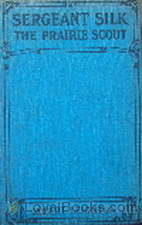 Sergeant Silk the Prairie Scout
Sergeant Silk the Prairie Scout
| |
 The Pilots of Pomona
The Pilots of Pomona
| |
By: United States Rubber Company | |
|---|---|
 The Romance of Rubber
The Romance of Rubber
This pamphlet was published in the early 20th century by the United States Rubber Company so that “coming generations of our country … have some understanding of the importance of rubber in our every day life… We believe the rubber industry will be better off if the future citizens of our country know more about it.” Learn about Christopher Columbus’s discovery of rubber, how the crafty British entrepreneur, Wickham, managed to smuggle rubber seedlings out of Brazil, and how rubber manufacturing came to be a “peculiarly American industry... | |
By: Johnny Gruelle (1880-1938) | |
|---|---|
 Raggedy Andy Stories
Raggedy Andy Stories
Raggedy Ann is a fictional character created by writer Johnny Gruelle (1880–1938) in a series of books he wrote and illustrated for young children. Raggedy Ann is a rag doll with red yarn for hair. The character was created in 1915 as a doll, and was introduced to the public in the 1918 book Raggedy Ann Stories. A doll was also marketed along with the book to great success. A sequel, Raggedy Andy Stories (1920) introduced the character of her brother, Raggedy Andy, dressed in sailor suit and hat. | |
By: Euripides (480-406 BC) | |
|---|---|
 The Bacchae
The Bacchae
This tragedy is based on the mythological story of King Pentheus of Thebes and his mother Agave, and their punishment by the god Dionysus (who is Pentheus' cousin) for refusing to worship him. | |
 The Trojan Women
The Trojan Women
Euripides' play follows the fates of the women of Troy after their city has been sacked, their husbands killed, and as their remaining families are about to be taken away as slaves. However, it begins first with the gods Athena and Poseidon discussing ways to punish the Greek armies because they condoned Ajax the Lesser for dragging Cassandra away from Athena's temple. What follows shows how much the Trojan women have suffered as their grief is compounded when the Greeks dole out additional deaths and divide their shares of women. | |
By: Friedrich de La Motte-Fouqué (1777-1843) | |
|---|---|
 Undine
Undine
Undine is a novel by Friedrich de la Motte Fouqué concerning Undine, a water spirit who marries a Knight named Huldebrand in order to gain a soul. It is an early German romance, which has been translated into English and other languages. The novel served as inspiration for two operas in the romantic style by Ernst Theodor Amadeus Hoffmann and Albert Lortzing, respectively, and two ballets: the nineteenth century Ondine and the twentieth century Undine. An edition of the book was illustrated by Arthur Rackham... | |
By: Giorgio Vasari (1511-1574) | |
|---|---|
 Lives of the Most Eminent Painters, Sculptors and Architects
Lives of the Most Eminent Painters, Sculptors and Architects
The Lives of the Most Excellent Italian Painters, Sculptors, and Architects, from Cimabue to Our Times, or Le Vite delle più eccellenti pittori, scultori, ed architettori, as it was originally known in Italian, is a series of artist biographies written by 16th century Italian painter and architect Giorgio Vasari, which is considered "perhaps the most famous, and even today the most- read work of the older literature of art", "some of the Italian Renaissance's most influential writing on art", and "one of the founding texts in art history"... | |
 The Lives of the Painters, Sculptors & Architects, Volume 1 (of 8)
The Lives of the Painters, Sculptors & Architects, Volume 1 (of 8)
| |
By: Howard R. Garis (1873-1962) | |
|---|---|
 Sammie and Susie Littletail
Sammie and Susie Littletail
Once upon a time there lived in a small house built underneath the ground two curious little folk, with their father, their mother, their uncle and Jane Fuzzy-Wuzzy. Jane Fuzzy-Wuzzy was the nurse, hired girl and cook, all in one, and the reason she had such a funny name was because she was a funny cook. She had long hair, a sharp nose, a very long tail and the brightest eyes you ever saw. She could stay under water a long time, and was a fine swimmer. In fact, Jane Fuzzy-Wuzzy was a big muskrat, and the family she worked for was almost as strange as she was. (excerpt from text) | |
 Rick and Ruddy
Rick and Ruddy
This delightful story is full of ups and downs involving a young boy and his dog, "a gift from the sea". The adventures range from playful antics to times of peril, and through it all, our protagonists (both human and canine alike) come through for each other as only a dog and his boy can! This adventurous and fun tale will bring you back to your own childhood memories...you and that special tail-wagger from the "good ol' days". | |
By: Rex Stout | |
|---|---|
 Under the Andes
Under the Andes
Under the Andes was written by Rex Stout years before his creation of the immensely popular Nero Wolfe series of novels, and while perhaps his future writing style is still blossoming, certainly his knack for weaving a fantastic tale of mystery and adventure will have most readers anxious for the next phase of adventure at every turn. The story finds two brothers and a pretty female companion on a journey which eventually takes them to a series of underground caves under the Andes of South America, where they encounter a lost tribe of Incas who have apparently survived hundreds of years oblivious of the outside world... | |
By: Helen Rowland (1875-1950) | |
|---|---|
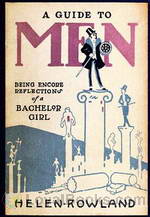 A Guide to Men: Being Encore Reflections of a Bachelor Girl
A Guide to Men: Being Encore Reflections of a Bachelor Girl
A series of occasionally witty one-liners, poems and considerations on the subject of Men, Women and their Conjunction. By turns tender, bland, sexist (in both directions!) and funny. | |
 Reflections of a Bachelor Girl
Reflections of a Bachelor Girl
| |
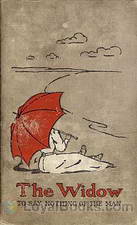 The Widow To Say Nothing of the Man
The Widow To Say Nothing of the Man
| |
 The Rubáiyát of a Bachelor
The Rubáiyát of a Bachelor
| |
By: James Blish (1921-1975) | |
|---|---|
 The Thing in the Attic
The Thing in the Attic
Honath the Pursemaker is a heretic. He doesn’t believe the stories in the Book of Laws which claims giants created his tree-dwelling race. He makes his opinion known and is banished with his infidel friends to the floor of the jungle where dangers abound. Perhaps he’ll find some truth down there. – The Thing in the Attic is one of Blish’s Pantropy tales and was first published in the July, 1954 edition of If, Worlds of Science Fiction magazine. | |
 One-Shot
One-Shot
| |
By: Frances M. A. Roe | |
|---|---|
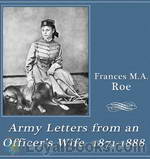 Army Letters from an Officer's Wife, 1871-1888
Army Letters from an Officer's Wife, 1871-1888
"There appeared from the bushes in front of me, and right in the path, two immense gray wolves . . . Rollo saw them and stopped instantly, giving deep sighs, preparing to snort, I knew . . . To give myself courage, I talked to the horse, slowly turning him around . . . when out of the bushes in front of us, there came a third wolf! The situation was not pleasant and without stopping to think, I said ‘Rollo, we must run him down - now do your best’ and taking a firm hold of the bridle, and bracing myself in the saddle, I struck the horse with my whip and gave an awful scream... | |
By: Francis Parkman | |
|---|---|
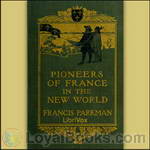 Pioneers of France in the New World
Pioneers of France in the New World
Francis Parkman (1823-1893) has been hailed as one of America’s first great historians and as a master of narrative history. Numerous translations have spread the books around the world. The American writer and literary critic Edmund Wilson (1895-1972) in his book O Canada (1965), described Parkman’s France and England in North America in these terms: The clarity, the momentum and the color of the first volumes of Parkman’s narrative are among the most brilliant achievements of the writing of history as an art... | |
 The Jesuits in North America in the 17th Century
The Jesuits in North America in the 17th Century
Parkman has been hailed as one of America's first great historians and as a master of narrative history. Numerous translations have spread the books around the world. The American writer and literary critic Edmund Wilson (1895-1972) in his book "O Canada" (1965), described Parkman’s France and England in North America in these terms: "The clarity, the momentum and the color of the first volumes of Parkman’s narrative are among the most brilliant achievements of the writing of history as an art... | |
 France and England in North America; a Series of Historical Narratives — Part 3
France and England in North America; a Series of Historical Narratives — Part 3
| |
 A Half Century of Conflict - Volume I France and England in North America
A Half Century of Conflict - Volume I France and England in North America
| |
By: Francis Parkman, Jr. (1823-1893) | |
|---|---|
 Montcalm and Wolfe
Montcalm and Wolfe
Francis Parkman (1823-1893) has been hailed as one of America's great nineteenth century historians, along with William Prescott, John Lothrop Motley, George Bancroft, and Henry Adams. He is a master of narrative history and is most known for his "The Oregon Trail" and his seven volume work on the history of the French and English in North America. "Montcalm and Wolfe", the seventh and last volume of the series, covers the conflict between England and France for supremacy in the New World from 1745 to 1884... | |
By: Francis Parkman (1823-1893) | |
|---|---|
 Historic Handbook of the Northern Tour
Historic Handbook of the Northern Tour
| |
By: Frederik Pohl | |
|---|---|
 The Knights of Arthur
The Knights of Arthur
Sailors Sam Dunlap and Arthur check in to a New York hotel to await their mate Vern Engdahl when a girl shows up proposing to purchase Arthur. They need guys like Arthur to help run the city, and the fact that he fits in a small suitcase is even better. – The Knights of Arthur was first published in the January 1958 edition of Galaxy Science Fiction magazine. | |
 Tunnel Under The World
Tunnel Under The World
This famous Pohl story explores cybernetic robots and implanted personalities in a way that certainly expanded my way of looking at reality. Is that wall really real? or is it just kinda, sorta real? And who am I? The protagonist, Guy Burckhardt, wakes up screaming from a horrible dream of explosions, searing fire, choking gas and other terrible ways to die. But he wakes up so it must have been just a bad nightmare, right? To find out that piece of information you will need to listen to this inventive and scary story. | |
 The Day of the Boomer Dukes
The Day of the Boomer Dukes
| |
 The Hated
The Hated
| |
 Pythias
Pythias
| |
By: Harold Speed | |
|---|---|
 The Practice and Science of Drawing
The Practice and Science of Drawing
THE PRACTICE & SCIENCE OF DRAWINGBY HAROLD SPEEDPREFACEPermit me in the first place to anticipate the disappointment of any student who opens this book with the idea of finding wrinkles on how to draw faces, trees, clouds, or what not, short cuts to excellence in drawing, or any of the tricks so popular with the drawing masters of our grandmothers and still dearly loved by a large number of people. No good can come of such methods, for there are no short cuts to excellence. But help of a very practical kind it is the aim of the following pages to give; although it may be necessary to make a greater call upon the intelligence of the student than these Victorian methods attempted... | |
By: James Schmitz (1911-1981) | |
|---|---|
 Legacy
Legacy
Ancient living machines that after millennia of stillness suddenly begin to move under their own power, for reasons that remain a mystery to men. Holati Tate discovered them—then disappeared. Trigger Argee was his closest associate—she means to find him. She's brilliant, beautiful, and skilled in every known martial art. She's worth plenty—dead or alive—to more than one faction in this obscure battle. And she's beginning to have a chilling notion that the long-vanished Masters of the Old Galaxy were wise when they exiled the plasmoids to the most distant and isolated world they knew.... | |
By: Austin Craig | |
|---|---|
 Lineage, Life and Labors of Jose Rizal
Lineage, Life and Labors of Jose Rizal
LINEAGE LIFE AND LABORS of JOSE RIZAL PHILIPPINE PATRIOTBY AUSTIN CRAIGINTRODUCTION In writing a biography, the author, if he be discriminating, selects, with great care, the salient features of the life story of the one whom he deems worthy of being portrayed as a person possessed of preeminent qualities that make for a character and greatness. Indeed to write biography at all, one should have that nice sense of proportion that makes him instinctively seize upon only those points that do advance his theme... | |
By: F. Marion Crawford (1854-1909) | |
|---|---|
 An American Politician
An American Politician
In 1880’s Boston, Mass. the good life is lead according to all the Victorian era societal rules of the New World. Political ambitions and the business of making money go hand in hand. A Senate seat suddenly opens up due to the current junior senator’s unexpected death, and the political machinations to fill the seat begin. Senatorial candidate John Harrington is a young idealist who thinks that fighting for truth and justice, regardless of political affiliation, is the way. But he is told he can’t possibly win because he isn’t partisan enough... | |
By: Henry W. Lucy (1845-1924) | |
|---|---|
 Faces and Places
Faces and Places
Faces and Places is a collection of articles on nineteenth century travel, events and personalities by the British journalist Henry Lucy, who wrote for the Daily News, a London newspaper. His open letter To Those About to Become Journalists rings as true today as when it was written.The first article, “Fred” Burnaby, includes a lively account of a balloon trip, while Night and Day on the Cars in Canada and Easter on Les Avants relate Lucy’s experiences of rail travel at that time. Other travel tales (A Night on a Mountain, Mosquitoes and Monaco, and Oysters and Arcachon) provide an insight into the Victorian Englishman’s attitude to Europe... | |
By: Baroness Orczy (1865-1947) | |
|---|---|
 I Will Repay
I Will Repay
This is a sequel novel to the Scarlet Pimpernel. The second Pimpernel book written by Orczy, it comes (chronologically) third in the series and should be read after Sir Percy Leads the Band and before The Elusive Pimpernel. | |
 Lord Tony's Wife
Lord Tony's Wife
Another adventure of the Scarlet pimpernel! As the title suggests, it follows the story of Lord Tony and his wife, Yvonne. It is full of suspense adventure and romance. Lord Tony and Yvonne elope after some disturbing happenings including an angry mob and an assault on Yvonne by her own father. Later a man set on revenge and with the help of Chauvelin steal Yvonne away, and Lord Tony must go to the Scarlet Pimpernel for assistance. Will they be able to save her and her father from the clutches of Pierre Adet and Chauvelin? Will Lord Tony ever even see his wife again? | |
 Laughing Cavalier; Ancestor of the Scarlet Pimpernel
Laughing Cavalier; Ancestor of the Scarlet Pimpernel
The enigmatic smile of The Laughing Cavalier of Franz Hals' famous painting invites you to wonder just what mischievousness hides behind that face. In this novel, inspired by the painting, Baroness Orczy recounts the adventures of an ancestor of her famous character, the Scarlet Pimpernel. Set in Holland during the turbulent times of 1623/1624, this is the story of a swashbuckling romanticist, whose desire for wealth and success always seems to be eclipsed by his sense of what is right and gentlemanly... | |
By: Emmuska Orczy Orczy (1865-1947) | |
|---|---|
 The Tangled Skein
The Tangled Skein
| |
 The Heart of a Woman
The Heart of a Woman
| |
 A Bride of the Plains
A Bride of the Plains
| |
 Petticoat Rule
Petticoat Rule
| |
By: William T. Hornaday (1854-1937) | |
|---|---|
 Our Vanishing Wild Life
Our Vanishing Wild Life
We are weary of witnessing the greed, selfishness and cruelty of “civilized” man toward the wild creatures of the earth. We are sick of tales of slaughter and pictures of carnage. It is time for a sweeping Reformation; and that is precisely what we now demand. -William Temple Hornaday | |
By: Charles Monroe Sheldon (1857-1946) | |
|---|---|
 In His Steps
In His Steps
In His Steps takes place in the railroad town of Raymond. The main character is the Rev. Henry Maxwell, pastor of the First Church of Raymond, who challenges his congregation to not do anything for a whole year without first asking: “What Would Jesus Do?” (taken from Wikipedia) | |
 Robert Hardy's Seven Days A Dream and Its Consequences
Robert Hardy's Seven Days A Dream and Its Consequences
| |
 The High Calling
The High Calling
| |
By: Mary H. Kingsley | |
|---|---|
 Travels in West Africa
Travels in West Africa
Mary Henrietta Kingsley (13 October 1862 – 3 June 1900) was an British explorer and writer who greatly influenced European ideas about Africa and its people. Kingsley was an outspoken critic of European colonialism, a champion for indigenous customs, and a dedicated campaigner for a revised British policy which supported traders and merchants over the needs of settlers and missionaries. Her adventures were extraordinary and fascinating. Among other things she fought with crocodiles, fell into native spear traps and was caught in a tornado on the slopes of Mount Cameroon... | |
By: Ellen Clacy | |
|---|---|
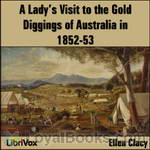 A Lady's Visit to the Gold Diggings of Australia in 1852-53,
A Lady's Visit to the Gold Diggings of Australia in 1852-53,
“If you have visions of a middle-aged parasol-bearing lady smiling sweetly from her carriage as she tours Bendigo think again. In 1852, 20 year old clergyman’s daughter Ellen and her brother boarded ship for Melbourne then set off to walk to Bendigo. Dressed in her blue serge skirt which doubled as nightwear, she camped under a tent made of blankets, had mutton, damper and tea most meals and on arrival lent her hand to gold washing. And seemed to enjoy it !And amongst other things she tells of colonial life , transportation, emigration and other gold-fields.But you will need to listen to hear more about bush-rangers and orphans as well as what she did with her parasol.” | |
By: Lucian of Samosata (120—180) | |
|---|---|
 Trips to the Moon
Trips to the Moon
The endeavour of small Greek historians to add interest to their work by magnifying the exploits of their countrymen, and piling wonder upon wonder, Lucian first condemned in his Instructions for Writing History, and then caricatured in his True History, wherein is contained the account of a trip to the moon, a piece which must have been enjoyed by Rabelais, which suggested to Cyrano de Bergerac his Voyages to the Moon and to the Sun, and insensibly contributed, perhaps, directly or through Bergerac, to the conception of Gulliver’s Travels. The Icaro-Menippus Dialogue describes another trip to the moon, though its satire is more especially directed against the philosophers. | |
By: Thomas Love Peacock | |
|---|---|
 Nightmare Abbey
Nightmare Abbey
Deep in the fens of the British coast sits the gloomy mansion that goes by the name Nightmare Abbey. It is inhabited by persons of very low opinion of the human race, and in fact they pride themselves in the depths of their detestation. Others of its denizens believe the ultimate exercise and product of the human mind ought to be chaos. Now let the young master of the house get snared by the wiles of a beautiful young lady. And for good measure, toss in another beautiful young lady. Now Scythrop... | |
 Maid Marian
Maid Marian
| |
 Gryll Grange
Gryll Grange
| |
 Crotchet Castle
Crotchet Castle
| |
By: Ontario Ministry of Education | |
|---|---|
 The Ontario Readers Third Book
The Ontario Readers Third Book
The Ontario Readers is a school book first published in 1909, by the Ontario Ministry of Education, containing short excerpts of literary works, both stories and poems, geared to grade-school age children. | |